精品范文-歌德英语简介
歌德

肯定了以集体劳动改造自然,建立 人间乐园的社会理想。
解析浮士德形象
一、
1.歌德本人的化身。
2.欧洲近代资产阶级先 进知识分子的形象。
3.人类积极精神的象征。
我要跳身进时代的奔波, 我要跳身进事变的车轮! 苦痛,欢乐,失败,成功,我都不问; 男儿的事业原本要昼夜不停。 我要在内心的自我中深深领略, 领略尽全人类所赋有的精神, 至崇高的,至深远的,我都要了解, 要把全人类的苦乐堆积在我寸心, 我的小我便扩大成全人类的大我。
所以在这儿要有环绕着的危险, 以便幼者壮者都过活着有为之年。 我愿意看见这样熙熙攘攘的人群, 在自由的土地上住着自由的国民。 我要呼唤对于这样的刹那: “你真美呀,请停留一下!” 我在地上的日子会有痕迹遗留, 它将不致永远成为乌有。—— 我在这样宏福的预感之中, 在将这最高的一刹那享受。
三、长篇诗剧《浮士德》
课程重点
《浮士德》的故 事梗概 浮士德的五大追 求
浮士德精神的实 质
1、成书过程
出处:
写作年份: 初稿浮士德:1768----1775年 浮士德片段:1788----1790年 浮士德悲剧第一部:1773----1808年 浮士德悲剧第二部:1825----1832年
浮士德精神
1、浮士德精神首先是一种笃于实践的入世 精神。 2、“浮士德精神”还是一种不甘堕落、对 自我永不满足的追求精神。
“ 歌德在自己的作品中,对当时的德国社会 的态度是带有两重性的。有时对它是敌视 的;……有时又相反,……他亲近它,“迁就” 它……这常常不过是他的各种情绪的表现而已; 在他心中经常进行着天才诗人和法兰克福市议 员的谨慎的儿子、可敬的魏玛的枢密顾问之间 的斗争,前者厌恶周围环境的鄙俗气,而后者 却不得不对这种鄙俗气妥协,迁就。因此,歌 德有时非常伟大,有时极为渺小;有时是叛逆 的、爱嘲笑的、鄙视世界的天才,有时则是谨 小慎微、事事知足、胸襟狭隘的庸人。……他 的气质、他的精力、他的全部精神意向都把他 推向实际生活,而他所接触的实际生活却是很 可怜的。他的生活环境是他应该鄙视的,但是 他又始终被困在这个他所能活动的唯一的生活 环境里。歌德总是面临着这种进退维谷的境 地……”(恩格斯)
歌德英语简介

歌德英语简介约翰沃尔夫冈冯歌德,德国闻名思想家、作家、科学家,他是魏玛的古典主义最闻名的代表。
下面是我为你整理的歌德英语简介,盼望对你有用!约翰沃尔夫冈冯歌德人物影响Faust works with Homers epic, Dantes Divine Comedy and Shakespeares Hamlet tied for the four classic European literature, William Meister points learning era and roaming era Two.Goethe has a great influence on world literature. His work is translated into 48 languages, is an important part of the classic. Goethe knows a variety of languages, familiar with the European countries in the historical era of literary works and forms, he translated, parody or writing the style of these works. Faust is simply a collection of European literary traditions. Goethe also has a strong interest in folk songs around the world, and actively collect works outside the mainstream of Europe. He participated in the world literature is the most prominent example of the two poems Western poetry and Sino-German four seasons faint chant. The former was influenced by Persian poet Hafez, who was influenced by Chinese drama and novels. Goethe hopes to understand the culture to improve the tolerance, his world literature should be called cross-cultural communication refers to a series of global dialogueand exchange. In these dialogues and exchanges, the commonality of different cultures is becoming more and more obvious, personality has not been denied. Goethes understanding of the worlds various cultures through extensive academic reading, textual translation, and tolerance of these views, calmly accept or ignore them. Goethe agrees with Kants ideas of art and science. His scientific practice and world literature practice is to find all the living body in different manifestation of unity and harmony.Goethe works into China is probably around the Wuxu. In 1922, Guo Moruo full translation of the juvenile Witt troubles was officially published, then he gradually translated Faust. It is worth mentioning that Goethes works have played a positive role in the Chinese Enlightenment. After the founding of new China, with the development of Sino-German cultural exchanges, Goethe and his works like a flashing star, in China, the more brilliant light. Peoples Literature Publishing House published a collection of three generations of Chinese Goethe researchers and translators academic achievements of the ten volumes of Goethe Collection, a Sino-German cultural exchange in the history of a major event. In the 1930s, Faust has entered the university classroom, in some schools to open the Western classics read class was studied. To the eve of the outbreak of the war, just a dozen years, Goethes main works in addition to William Mansis roaming era and affinity two long translation,almost all have the Chinese translation. Goethes popularity in China is evident.歌德英语简介相关。
歌德英语简介文档3篇
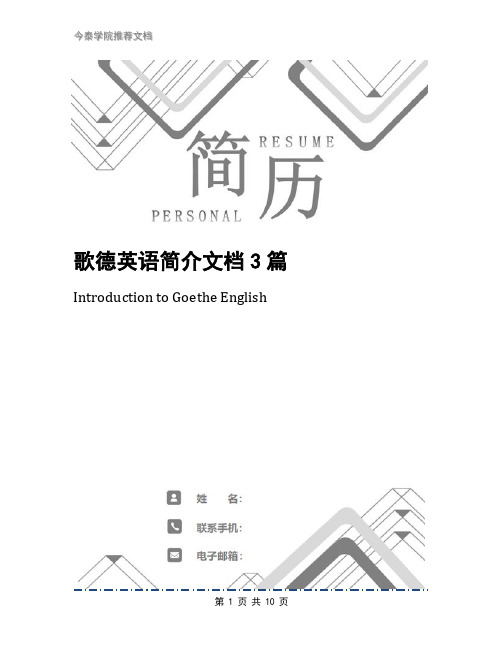
歌德英语简介文档3篇Introduction to Goethe English歌德英语简介文档3篇前言:个人简历是求职者给招聘单位发的一份简要介绍,包括个人的基本信息、过往实习工作经验以及求职目标对应聘工作的简要理解,在编写简历时,要强调工作目标和重点,语言精简,避免可能会使你被淘汰的不相关信息。
写出一份出色的个人简历不光是对找工作很有用处,更是让陌生人对本人第一步了解和拉进关系的线。
本文档根据个人简历内容要求和特点展开说明,具有实践指导意义,便于学习和使用,本文下载后内容可随意调整修改及打印。
本文简要目录如下:【下载该文档后使用Word打开,按住键盘Ctrl键且鼠标单击目录内容即可跳转到对应篇章】1、篇章1:约翰·沃尔夫冈·冯·歌德简介文档2、篇章2:约翰·沃尔夫冈·冯·歌德写作特点文档3、篇章3:约翰·沃尔夫冈·冯·歌德人物影响文档约翰·沃尔夫冈·冯·歌德,德国著名思想家、作家、科学家,他是魏玛的古典主义最著名的代表。
下面是小泰为你整理的歌德英语简介,希望对你有用!篇章1:约翰·沃尔夫冈·冯·歌德简介文档Johann Wolfgang von Goethe (August 28, 1722 - March 22, 1832), was born in Frankfurt am Main, a famous German thinker, writer, scientist, he is Weimar The most famous representative of classicalism. And as a writer of poetry, drama and prose works, he is one of the greatest German writers, but also an outstanding figure in the field of world literature. He wrote a play in 1773, "Gertz von Bethlein", from the famous German literary world. 1774 published a "juvenile Witt's troubles", but also made him fame. In 1776 began to serve Weimar Principality. 1831 completed the "Faust", the following year in Weimar died.篇章2:约翰·沃尔夫冈·冯·歌德写作特点文档【按住Ctrl键点此返回目录】Goethe not only good painting, extensive research on the natural sciences, its creation includes lyrics, no rhyme free poetry, group poems, long narrative poems, herdsmen poems, historical poems, historical drama, tragedy, drama, novels, short stories,educational novels , Epistolary novels and autobiographical poetry, prose and other genres of literary works. The most famous is the epistolary novel "Juvenile Witt's troubles" (1774), poetic philosophy tragedy "Faust" (1774 ~ 1831) and the novel "William Masters" (1775 ~ 1828). "Youth to maintain the trouble" because of a generation of young anti-feudal voice, by the masses warm welcome, so that Goethe from the enjoyment of the world's voice. "Faust" based on the German 16th century on the legend of Dr. Faust, to the processing and transformation. Is the rise of the European bourgeoisie bourgeois advanced people continue to explore, the pursuit ofart summary. The tragedy is not only the structure of the magnificent, colorful, into the realism, romanticism and symbolism as a whole, and let the main characters Faust and the devil Felicity of the whole words and deeds are formed good and evil, line and love, The dialectical development of relations.The brilliant achievement of Goethe's life, especially the later creation, is inseparable from his adherence to this principle of realism. Goethe had led the frantic movement in his early years and preferred romanticism. But later realized that the romantic "morbid", turned to classicalism. Goethe advocated by classicalism, in essence, is realism. Realism is a focus of Goethe's later theoretical thinking. In the historical process of the development of Western realism theory, Goethe's realist literary thought is regarded as a milestone, which has given the development of European realist literature directly and forcefully. The European critique of the realist literary movement, which emerged in the 1930s and 1930s, was clearly influenced by the profound literary and artistic thoughts of Goethe.He does not attempt to "embody something of abstraction" in his work, but merely "sensible, vivid, lovable, colorful", "impression", "artistic" Processing, through the "vivid description" to provideto people. Goethe here does not specify the source of "impression", but the content of the whole paragraphis not difficult to understand, the so-called "impression" is not anything else, and it is the objective reality of life in the writer's subjective consciousness Writers in the social practice of a "view" of objective life. Because he thinks this is the real basis and basis of literary creation.Goethe talked with Ekman about the creation of Faust, who, on the one hand, admitted that "there is no line of poems without a clear and in-depth study of the world and life of the clear signs", on the other hand he said: "I If you do not put the world in the heart, I will turn a blind eye, ... ... we are surrounded by light and color, but our eyes if thereis no light and color, also can not see the outside of light and color. He said the "premonition" and the eyes of the "light and color", that is, the writer can dynamically stimulate and predict the psychological conditions of life, or the creation of the main bodyshould have a harsh, spiritual, Psychological form. From this can be read out of such a meaning: literary creators of the specific things outside the feelings and grasp, depending on the corresponding subject conditions, if you do not have this condition, the objective existence of things even if it does not become meaningful Object, and thus can not lead to his creative impulse.篇章3:约翰·沃尔夫冈·冯·歌德人物影响文档【按住Ctrl键点此返回目录】"Faust" works with Homer's epic, Dante's "Divine Comedy" and Shakespeare's "Hamlet" tied for the four classic European literature, "William Meister" points "learning era" and "roaming era" Two.Goethe has a great influence on world literature. His work is translated into 48 languages, is an important part of the classic. Goethe knows a variety of languages, familiar with the European countries in the historical era of literary works and forms, he translated, parody or writing the style of these works."Faust" is simply a collection of European literary traditions. Goethe also has a strong interest in folk songs around the world, and actively collect works outside the mainstream of Europe. He participated in the "world literature" is the most prominent example of the two poems "Western poetry" and "Sino-German four seasons faint chant." The former was influenced by Persian poet Hafez, who was influenced by Chinese drama and novels. Goethe hopes to understand the culture to improve the tolerance, his "world literature" should be called "cross-cultural communication" refers to a series of global dialogue and exchange. In these dialogues and exchanges, the commonality of different cultures is becoming more and more obvious, personality has not been denied.Goethe's understanding of the world's various cultures through extensive academic reading, textual translation, and tolerance of these views, calmly accept or ignore them. Goethe agrees with Kant's ideas of art and science. His scientific practice and "worldliterature" practice is to find all the living body in different manifestation of unity and harmony.Goethe works into China is probably around the Wuxu. In 1922, Guo Moruo full translation of the "juvenile Witt troubles" was officially published, then he gradually translated "Faust". It is worth mentioning that Goethe's works have played a positive role in the Chinese Enlightenment. After the founding of new China, with the development of Sino-German cultural exchanges, Goethe and his works like a flashing star, in China, the more brilliant light. People's Literature Publishing House published a collection of three generations of Chinese Goethe researchers and translators academic achievements of the ten volumes of "Goethe Collection", a Sino-German cultural exchange in the history of a major event. In the 1930s, "Faust" has entered the university classroom, in some schools to open the "Western classics read" class was studied. To the eve of the outbreak of the war, just a dozen years, Goethe's mainworks in addition to "William Mansi's roaming era" and "affinity" two long translation, almost all have the Chinese translation. Goethe's popularity in China is evident.-------- Designed By JinTai College ---------。
歌德传记(英文版)
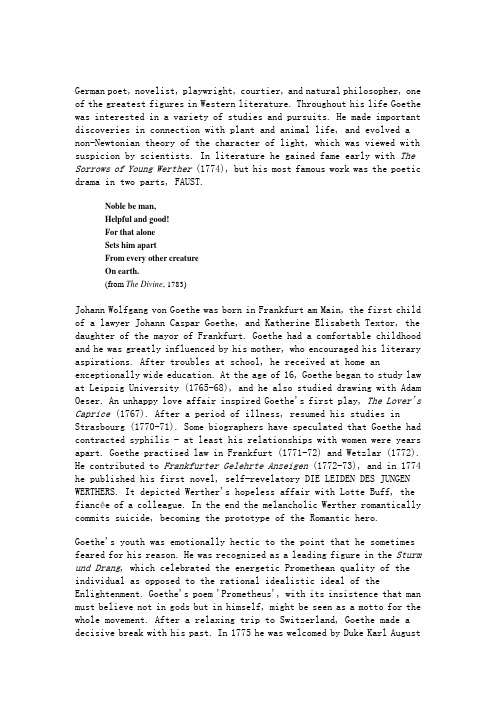
German poet, novelist, playwright, courtier, and natural philosopher, one of the greatest figures in Western literature. Throughout his life Goethe was interested in a variety of studies and pursuits. He made important discoveries in connection with plant and animal life, and evolved a non-Newtonian theory of the character of light, which was viewed with suspicion by scientists. In literature he gained fame early with The Sorrows of Young Werther(1774), but his most famous work was the poetic drama in two parts, FAUST.Noble be man,Helpful and good!For that aloneSets him apartFrom every other creatureOn earth.(from The Divine, 1783)Johann Wolfgang von Goethe was born in Frankfurt am Main, the first child of a lawyer Johann Caspar Goethe, and Katherine Elisabeth Textor, the daughter of the mayor of Frankfurt. Goethe had a comfortable childhood and he was greatly influenced by his mother, who encouraged his literary aspirations. After troubles at school, he received at home an exceptionally wide education. At the age of 16, Goethe began to study law at Leipzig University (1765-68), and he also studied drawing with Adam Oeser. An unhappy love affair inspired Goethe's first play, The Lover's Caprice (1767). After a period of illness, resumed his studies in Strasbourg (1770-71). Some biographers have speculated that Goethe had contracted syphilis - at least his relationships with women were years apart. Goethe practised law in Frankfurt (1771-72) and Wetzlar (1772). He contributed to Frankfurter Gelehrte Anzeigen (1772-73), and in 1774 he published his first novel, self-revelatory DIE LEIDEN DES JUNGEN WERTHERS. It depicted Werther's hopeless affair with Lotte Buff, the fiancée of a colleague. In the end the melancholic Werther romantically commits suicide, becoming the prototype of the Romantic hero.Goethe's youth was emotionally hectic to the point that he sometimes feared for his reason. He was recognized as a leading figure in the Sturm und Drang, which celebrated the energetic Promethean quality of the individual as opposed to the rational idealistic ideal of the Enlightenment. Goethe's poem 'Prometheus', with its insistence that man must believe not in gods but in himself, might be seen as a motto for the whole movement. After a relaxing trip to Switzerland, Goethe made a decisive break with his past. In 1775 he was welcomed by Duke Karl Augustinto the small court of Weimar, where he worked in several governmental offices. Occasionally he read aloud his texts to a selected group of persons - among them the Duke and the two Duchesses. To his disappointment a dog-trainer was also allowed to amuse in the court theatre."What you don't feel, you will not grasp by art,Unless it wells out of your soulAnd with sheer pleasure takes control,Compelling every listener's heart.But sit - and sit, and patch and knead,Cook a ragout, reheat your hashes,Blow at the sparks and try to breedA fire out of piles of ashes!Children and apes may think it great,If that should titillate your gum,But from heart to heart you will never create.If from your heart it does not come."(from Faust I)During this period Goethe did not have much time to publish fiction. He was a council member and member of the war commission, director of roads and services, and managed the financial affairs of the court. His great love in this period was Charlotte von Stein, an older married woman, but the relationship was platonic. However, Goethe's scientific researches were more successful. He discovered the human intermaxilarry bone (1784), and formulated a vertebral theory of the skull. In 1786-88 he made a journey to Italy."In Rome I have found myself for the first time," Goethe wrote. He drew statues and ruins, collected antique and botanical samples, and was shocked by the primitive power of an ancient Greek temple - Renaissance art did not interest him. The journey ended Goethe's celibacy and inspired his play IPHIGENIE AUF TAURIS, and RÖMISHE ELEGIEN, sensuous poems relating partly to Christiane Vulpius, who became Goethe's mistress in 1789. The ancient monuments he saw in Italy significantly influenced his growing commitment to a classical view of art. His emotional dependence on Charlotte ended, and in spite of public pressure, he continued to live happily unmarried with Christiane. Goethe was released from day-to-day governmental duties to concentrate on writing, although he was still general supervisor for arts and sciences, and director of the court theatres (1791-1817)."Three things are to be looked to in a building: that it stands on the right spot;that it be securely founded; that it be successfully executed." (from ElectiveAffinities, 1808)In the 1790s Goethe contributed to Friedrich von Schiller´s journal Die Horen, published WILHELM MEISTERS LEHRJAHRE (Wilhelm Meister's Apprenticeship) in 1795-96, and continued his writings on the ideals of arts and literature in his own journal Propyläen. (Note: Goethe was buried near Schiller in the ducal vault at Weimar.) Wilhelm Meister's story had preoccupied the author for many years. Wilhelm is disillusioned by love, he starts actively to seek out other values, and becomes an actor and playwright. Whereas Werther's life ended in despair, Meister has a more optimistic spirit. At the end he says: "... I know I have attained a happiness which I have not deserved, and which I would not change with anything in life." Wim Wenders and Peter Handke made in 1974 a modernized film adaptation of the book, Wrong Movement, in which Meister's journey has a sad, lonely note. "If only politics and poetry could be united," he says to his friend Laertes, who answers: "That would be the end of longing and the end of the world."During the French Revolution Goethe reported in letters to his family his inconveniences, when he was forced to leave his home and dear garden after the French army attacked Prussia. He also saw killings and looted villages, and wrote in the middle of cannon fire. Although Goethe supported freedom and progress, he wanted to preserve the bourgeois or hisartistic-individualistic way of life. The majority of the German intelligentsia greeted with enthusiasm the goals of the revolution, including Kant, Schiller, and Friedrich Schlegel. Goethe remained creative during his last period. He married in 1806 Christiane Vulpius, with whom he had lived nearly 18 years, wrote his autobiography, Poetry and Truth (1811-1833), and completed the novel WILHELM MEISTERS WANDERJAHRE (1821-9).The first part of his masterwork, Faust, appeared in 1808, and the second part in 1832. Goethe had worked for most of his life on this drama. It was based on Christopher Marlowe's Faus t, and depicted a disillusioned scholar, who makes a pact with Satan. The original figure in the Faust legend was Gregorius Faustus (or Gregorius Sabellicus, Faustus Junior, c 1480-1510/1), a seeker of forbidden knowledge. His true identity is not known, but he claimed to be an astrologer, expert in magic, and an alchemist. This legend attracted Christoper Marlowe, who offered in his play a psychological study of the battle between good and evil. Marlowe's play ends with the protagonist's damnation. Goethe's story created a new persona for the Devil - Mephistopheles was a gentleman, who had adopted the manners of a courtier. Faust's lust for knowledge is limitless and he makes a contract with Mephistopheles: he will die at the moment he declares himself satisfied. In the first part Faust loses Margaret, an innocent girl, who is condemned to death for murdering her illegitimatechild by Faust. In the philosophical second part Faust marries Helen of Troy and creates a happy community. Faust is finally satisfied, but Mephistopheles loses his victory, when angels take Faust to heaven.From 1791 to 1817 Goethe was the director of the court theatres. He advised Duke Carl August on mining and Jena University, which for a short time attracted the most prominent figures in German philosophy, including Hegel and Fichte. He edited Kunst and Altertum (1816-32) and Zur Naturwissenschaft (1817-24). In 1812 Goethe met the famous composer Ludwig van Beethoven in Teplitz. Beethoven had admired Goethe already in his youth, although he considered Goethe's attitude toward the nobility too servile. Beethoven composed several music pieces based on the author's texts, among them Egmont. Franz Schubert's (1797-1828) first Lieder masterpiece, 'Gretchen am Spinnrade', took the words from Faust, but Goethe did not much appreciate Schubert's musical attempts.At the age of 74 Goethe fell in love with the 19-year old Ulrike von Levetzow. He followed her with high hopes from Marienbad to Karlsbad, and then returned disappointed to Weimar. There he wrote The Marienbad elegy, the most personal poem of his later years. Goethe died in Weimar on March 22, 1832. He and Schiller, who died over a quarter of a century earlier, are buried together, in a mausoleum in the ducal cemetery. The Goethe House and Schiller House stand in the town, and the two statues of these literary giants are outside the National Theatre.For further reading: Goethe: The Poet and the Age. Vol. II.by Nicholas Boyle(2000); Unterirdische Gänge. Goethe, Freimaurerei und Politik by W. Daniel Wilson(1999); Das Goethe-Tabu by W. Daniel Wilson (1999); Christiane un Goethe bySigrid Damm (1999); Goethes "Werther": Kritik und Forschung by Peter HansHerrmann (1994); Goethe: The Poet and the Age. Vol. I. by Nicholas Boyle (1991);Wilhelm Meister: Das Ende der Kunst und die Wiederkehr des Mythos by HanneloreSchlaffer (1989); "The Sorrows of Young Werther" by Martin Swales (1987); Goethe'sFaust: A Critical Reading by L. Dieckmann (1972); Goethe's Novels by Hans Reiss(1969); Goethe's "Die Wahlverwandtschaften": A Literary Interpretation by HarryGeorge Barnes (1967);Goethe: A Critical Introduction by H. Hatfield (1963);Goethe: A Psychoanalytic Study by Kurt Eissler (1963); Goethe-Bibliographie (1955-,serial); Goethe's "Wilhelm Meister" by Karl Schlechta (1953); Goethe, The History ofa Man, 1749-1832by E.Ludwig (1928); T he Life and Works of Goethe by G.H.Lewes (1855); Gespräche mit Goethe by Johann Eckermann (1836)- Museums:Johann Wolfgang von Goethe's House (Goethehaus), Am Frauenplan 1. Goethe livedthere for fifty years. - Johann Wolfgang von Goethe's Summerhouse, im Park an derIlm. Goethe started there Iphigènie - In Weimar is a copy of Goethe's Gartenhaus;also the furniture and other details follow the original. - Suomeksi on julkaistu myösmm. Torquato Tasso(1913) Juhani Siljo n suomentamana, kaksi laitosta Valittujateoksia, ensimmäinen 1932 (8 osaa) ja toinen 1956 (3 osaa) sekä Goethen elämäkertaV.A. Koskenniemen kirjoittamana.Faust - first part published 1808, the second 1832. - In Heaven Mephistophelesobtains permission to try to effect the ruin of the soul of Faust, an old scholar who isdisillusioned with the world. Faust enters into a compact to become Mephistopheles'sservant if he should exclaim, 'Stay, thou art so fair.' Faust seduces a young girl,Margaret (in German, Margarete, or its diminutive, Gretchen). When she asks Faust,"Do you believe in God?", he answers: "Does not the heaven vault above? / Is theearth not firmly based down here? / And do not, friendly, / Eternal stars arise? /Do we not look into each other's eyes, / And all in you is surging, / To your headand heart, / And weaves in timeless mystery, / Unseeable, yet seen, around you?"She brings him a child, but panics and drowns it, and in the end waits for herexecution for the crime, refusing to flee with Faust. The second part is extremelycomplex. Helen, symbolizing perfect beauty, is recalled from Hades. Faust attemptsto justify his existence by reclaiming land from the sea in order to found an idealsociety, but his plan fails. Faust's soul is finally rescued by a angels. - Faust versions:Gotthold Lessing's (1729-1781) lost play Faust, Don Juan/Don Giovanni(perhapsbest known from the Opera by Lorenzo Ponte and Wolfgang Amadeus Mozart),Oscar Wilde's novel The Picture of Dorian Gray, Dorothy L. Sayers's play The Devilto Pay(1939), Thomas Mann's novel Doctor Faustus (1947). - Film adaptations:1926, dir. by F.W. Murnau; film All That Money Can Buy,1941, dir. by WilliamDieterle, based on Stephen Vincent Benét work; 1949, dir by René Clair (La Beautédu Diable); 1974, dir. by Brian DePalma (Phantom of the Paradise, based loosely onGaston Leroux's novel Phantom of the Opera).- Opera: Gounod's Faust(1859),Buïto's Mefistotele (1866), Berlioz's La Damnation de Faust (1893), Busoni's DoktorFaust (1925) - Animation: 1994, dir.by Jan Svankmaijer - English translations ofFaust among others by Isaiah BerlinSelected works:•GÖTZ UND BERLICHINGEN, 1773 - Iron Hand - suom. - (transl. among others by W.Scott)•DIE LEIDEN DES JUNGEN WERTHERS, 1774 - The Sorrows of Young Werther - Nuoren Wertherin kärsimykset, suom. V olter Kilpi (1904)•IPHIGENIE AUF TAURIS, 1787 - Iphigenia in Tauris - Iphigenia Tauriissa, suom. Eino Leino 1910•EGMONT, 1788 - trans. - suom. J.A.Hollo•RÖMISHE ELEGIEN, 1790 - Roman Elegies•FAUST, EIN FRAGMENT, 1790•TORQUATO TASSO, 1790 - suom. - (see the myth that Tasso was imprisoned because of his love for Duke Alfonso's sister Leonoro)•WILHELM MEISTERS LEHRJAHRE, 1796 - Wilhelm Meister´s Apprenticeship (Thomas Carlyle's translation in 1824) - Wilhelm Meisterin oppivuodet - film Wrong Movement (1974), dir. by Wim Wenders, screrenplay by Peter Handke, starring Rüdiger Vogler, Hanna Schygulla, Hans Christian Blech, Peter Kern•HERMANN UND DOROTHEA, 1797 - Herman ja Dorothea•FAUST I, 1808 - trans. - suom. Valter Juva (1916), Otto Manninen (1936)•DER W AHLVERW ANDTSCHAFTEN, 1809 - Elective Affinities - Vaaliheimolaiset, suom. J.A. Hollo•ZUR FARBENLEHRE, 1810•ITALIANISCHE REISE I-II, 1816-17 - The Italian Journey•WEST-ÖSTLICHER DIV AN, 1819 - Divan of West and East•WILHELM MEISTERS W ANDERJAHRE, 1821 - Wilhelm Meister´s Travels •FAUST II, 1832 - trans. - suom. Otto Manninen•AUS MEINEM LEBEN. DICHTUNG UND WAHRHEIT, 1811-33 - Poetry and Truth - Tarua ja totta elämästäni, suom. J.A. Hollo•Collected works editions: WERKE (1887-1919, 143 vols.); WERKE (1948-64, 14 vols.);GEDENKAUSGABE DER WERKE, BRIEFE UND GESPRÄCHE (1948-71, 27 vols.);COLLECTED WORKS (1983-89, 12 vols.); SÄMTLICHE WERKE (1986-, in progress)。
歌德
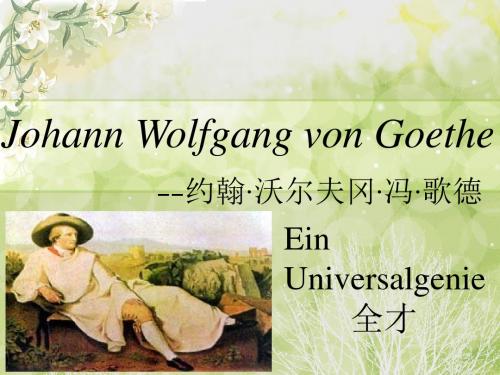
Seine Lieben(生活)
Aussprüche(谚语) • Jedes bemü ht (尽力)sich stä ndig um Selbst-verbesserung, kann schließ lich folgen 。
• 凡是自强不息者,最终都会成功。
• Wenn ich dich lieb habe, was geht’s dich an? • 我爱你,与你无关。
Wichtige Erfahrungen(经历)
1772 ging Goethe für kurye Yeit in das benachbarte Wetzlar.Sein Tod und Goethes eigene unglücklicher Liebe regten ihn an,den Roman,,Die Leiden des jungen Werther´´zu schreiben. Von 1786 bis 1788 macht Goethe die für ihn sehr wichtige Reise nach Italien.Durch die Reise bekam er viele neue Anregungen(启 示). 1795 lernte Goethe den Dichter Friedrich von Schiller kennen. Dieser ermunterte(鼓舞) ihn, wieder mehr zu shreiben.Auch Goethe half Schiller für Leiden des jungen Werther
Hauptwerke
《Der
gefesselte Prometheus》
Nach seiner Rückkehr(返回)nach Weimar,nahm er ein junges,einfaches Mädchen names Christine Vulpius zu sich in sein Haus. Er bekam mit ihr eine Kind.Heriate wollte er jedoch keine,er wollte sich nicht binden.Manche Frau hat er unglücklich zurückgelassen.
【人物传记】欧洲诗圣文豪兼智者──歌德
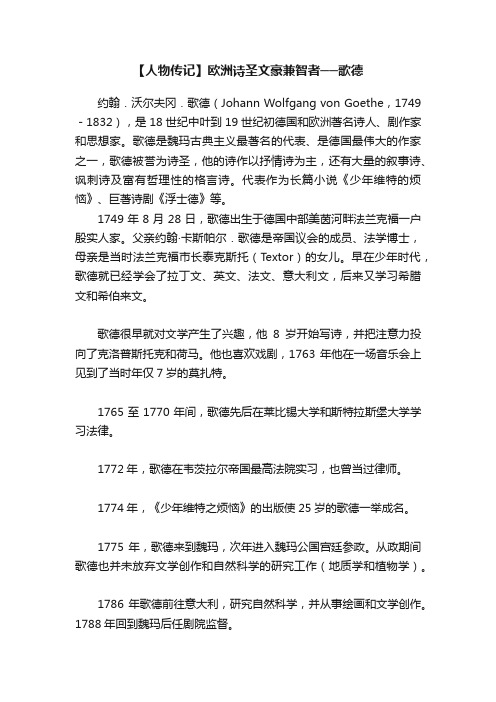
【人物传记】欧洲诗圣文豪兼智者──歌德约翰.沃尔夫冈.歌德(Johann Wolfgang von Goethe,1749-1832),是18世纪中叶到19世纪初德国和欧洲著名诗人、剧作家和思想家。
歌德是魏玛古典主义最著名的代表、是德国最伟大的作家之一,歌德被誉为诗圣,他的诗作以抒情诗为主,还有大量的叙事诗、讽刺诗及富有哲理性的格言诗。
代表作为长篇小说《少年维特的烦恼》、巨著诗剧《浮士德》等。
1749年8月28日,歌德出生于德国中部美茵河畔法兰克福一户殷实人家。
父亲约翰‧卡斯帕尔.歌德是帝国议会的成员、法学博士,母亲是当时法兰克福市长泰克斯托(T extor)的女儿。
早在少年时代,歌德就已经学会了拉丁文、英文、法文、意大利文,后来又学习希腊文和希伯来文。
歌德很早就对文学产生了兴趣,他8岁开始写诗,并把注意力投向了克洛普斯托克和荷马。
他也喜欢戏剧,1763年他在一场音乐会上见到了当时年仅7岁的莫扎特。
1765至1770年间,歌德先后在莱比锡大学和斯特拉斯堡大学学习法律。
1772年,歌德在韦茨拉尔帝国最高法院实习,也曾当过律师。
1774年,《少年维特之烦恼》的出版使25岁的歌德一举成名。
1775年,歌德来到魏玛,次年进入魏玛公国宫廷参政。
从政期间歌德也并未放弃文学创作和自然科学的研究工作(地质学和植物学)。
1786年歌德前往意大利,研究自然科学,并从事绘画和文学创作。
1788年回到魏玛后任剧院监督。
1794年,歌德开始了同德国著名诗人席勒的友谊,一直延续到1805年席勒去世。
这一时期席勒和歌德合作创作了很多诗歌,并创办文学杂志和魏玛歌剧院。
席勒和歌德合作的这段时间被称为德国文学史上的「古典主义」时代。
歌德晚年的创作极其丰富,重要作品有自传性作品《诗与真》、长篇小说《亲和力》和《威廉.麦斯特的漫游时代》,抒情诗集《西方和东方的合集》等。
在生命的最后几年,歌德终于完成了历时数十年之久的两部名著:《浮士德》和《威廉.迈斯特》。
【实战英语听力】Lesson38 歌德 Goethe (德国)
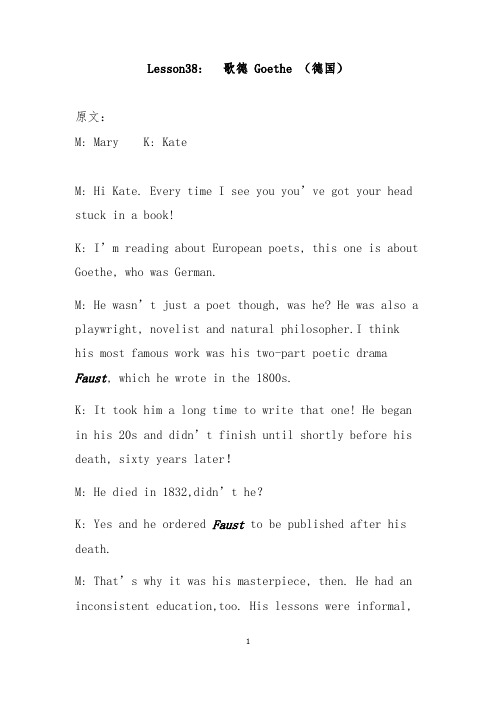
Lesson38: 歌德 Goethe (德国)原文:M: Mary K: KateM: Hi Kate. Every time I see you you’ve got your head stuck in a book!K: I’m reading about European poets, this one is about Goethe, who was German.M: He wasn’t just a poet though, was he? He was also a playwright, novelist and natural philosopher.I think his most famous work was his two-part poetic drama Faust, which he wrote in the 1800s.K: It took him a long time to write that one! He began in his 20s and didn’t finish until shortly before his death, sixty years later!M: He died in 1832,didn’t he?K: Yes and he ordered Faust to be published after his death.M: That’s why it was his masterpiece, then. He had an inconsistent education,too. His lessons were informal,taught by his father,who was an Imperial Councillor, various tutors and his mother.K: He must have had some special talent though because by the time he was eight he had grasped Latin, Greek,French and Italian.M: So, he was multi-lingual. When he was sixteen he went to university to study law, because his father wanted him to. But, I think in his heart he would have rather studied something like literature.K: Me too, that’s why when he was at university he started to write Rococo poems and lyrics.M: I think his true love influenced him too. He met Anna Kathchen Schonkopf while he was there.K: So, that’s the girl in his collection of poems called “Annette”, it sounds so romantic.M: Just after that he also wrote some poems which were put to music. He was very sick during that time, recovering from a lung infection, I think.K: Do you know that he wrote about another woman? The Sorrows of Young Werther, a novel written in 1774,was about his unrequited love for his friend’s fiancée.M: Really? He was involved in politics too I think. He worked as the Head of Commission for War and Road Construction.K: There wad another woman too, an Italian lady who was beautiful, but uneducated. He finally married her in 1806,but it was a secret.M: What an interesting life he must have led!译文:M: 玛莉 K: 凯特M: 你好,凯特。
作文素材:德国作家歌德的个人介绍_3000字
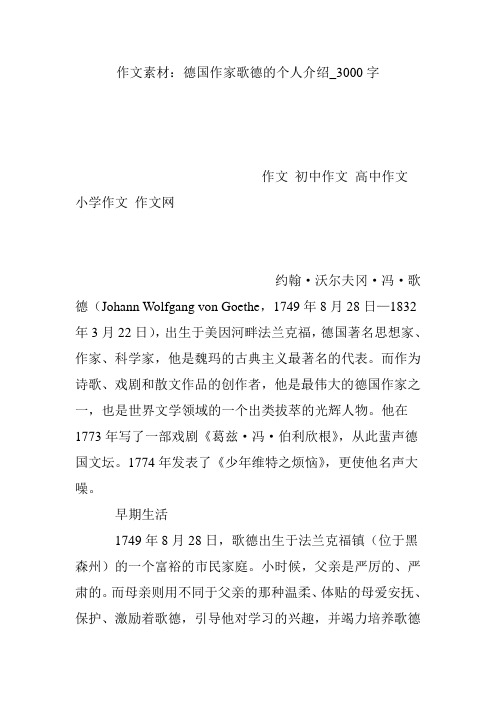
作文素材:德国作家歌德的个人介绍_3000字作文初中作文高中作文小学作文作文网约翰·沃尔夫冈·冯·歌德(Johann Wolfgang von Goethe,1749年8月28日—1832年3月22日),出生于美因河畔法兰克福,德国著名思想家、作家、科学家,他是魏玛的古典主义最著名的代表。
而作为诗歌、戏剧和散文作品的创作者,他是最伟大的德国作家之一,也是世界文学领域的一个出类拔萃的光辉人物。
他在1773年写了一部戏剧《葛兹·冯·伯利欣根》,从此蜚声德国文坛。
1774年发表了《少年维特之烦恼》,更使他名声大噪。
早期生活1749年8月28日,歌德出生于法兰克福镇(位于黑森州)的一个富裕的市民家庭。
小时候,父亲是严厉的、严肃的。
而母亲则用不同于父亲的那种温柔、体贴的母爱安抚、保护、激励着歌德,引导他对学习的兴趣,并竭力培养歌德掌握对于文学的正确理解能力。
母亲常常把他放在自己的膝头,讲述各种各样有趣的故事给他听。
母亲的语言表达能力很强,言辞新奇而丰富,歌德常常听得如醉如痴。
也许正是传承了母亲的这种才能,歌德成年以后母亲仍是跟他像朋友般共同探讨问题。
对于儿子的作品,母亲是凡有必读,并总能给予恰如其分的评论。
歌德悟性很高,妈妈一点就通,并能很快完善自己暴露出来的不足。
除了1750年12月7日出生的妹妹科尼丽亚·弗里德里柯·克里斯蒂娜之外,约翰·沃尔夫冈·冯·歌德的其他兄弟姐妹都很早夭折了。
1758年,歌德染上了天花。
歌德受到父亲和家庭教师的教育,也学习骑术和击剑。
歌德很早就已经对文学产生了兴趣。
在这方面他首先把注意力投向了克洛普斯托克和荷马。
14岁时,他就想参加一个田园诗协会。
同时,他也喜欢戏剧,因此在法国占领期间他频频造访法国剧院。
1763年他在一场音乐会上见到了当时年仅7岁的莫扎特。
1765年9月30日他离开法兰克福,到莱比锡学习法学。
英语歌德介绍
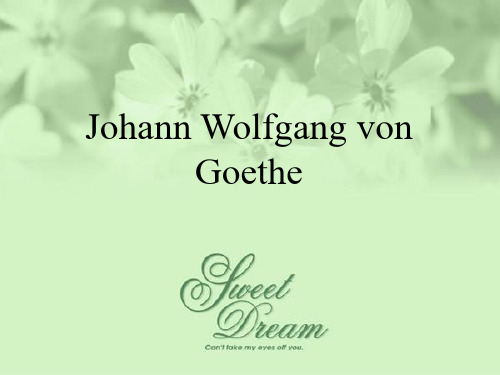
Johann Wolfgang von Goethe (28 August 1749 – 22 March 1832) was a German writer, scientist, and philosopher. Goethe was born in Frankfurt am Main ,Germany. Goets of poetry, drama, literature, theology, humanism, science, and painting.
Every day serves as a torturous reminder that Lotte will never be able to requite his love. Out of pity for her friend and respect for her husband, Lotte comes to the decision that Werther must not visit her so frequently. He visits her one final time, and there, both overcome with emotion after Werther’s recitation of a portion of Ossian(奥西恩,传 说3世纪爱尔兰英雄和吟游诗人), they kiss. Werther had realized even before this incident that one of them--Lotte, Albert, or Werther himself--must die. Unable to hurt anyone else, Werther sees no other choice but to take his own life. After composing a farewell letter (to be found after he commits suicide), he writes to Albert asking for two pistols, under a pretence that he is going hunting. Lotte receives the request with great emotion and sends the pistols, despite understanding what he will do with them. Werther then shoots himself.
歌德
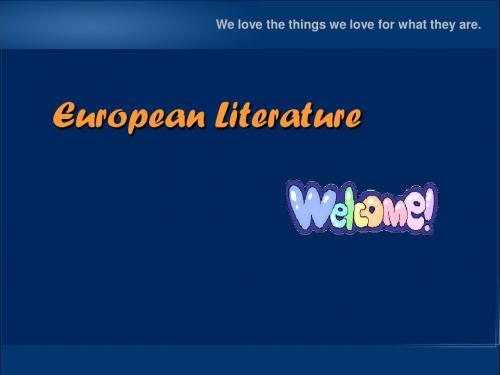
We love the things we love for what they are.
两人的推心置腹 始于18世纪年代 中期。席勒命苦, 只享受这分友情 10年。歌德比席 勒年长10岁,但 在席勒死后又活 了二十多年,承 受了二十多年刺 心的怀念。
1805年之后 席勒去世后一年,歌德和克里斯蒂安娜·福尔皮乌斯 结了婚。歌德从1789年起与她同居,两人生有一子。 在埃尔富特(Erfurt)召开诸侯大会之际,拿破仑一 世接见了歌德,并授予他荣誉军团勋章。 1832年4月22日,歌德因病离开了人世。他的著名 遗言是:“多些光!”。4月26日葬于诸侯墓地。
生平简介
出身与青少年时期(1749年-1765年): 歌德的父亲是帝国议会的成员。歌德首先就读于全国最好的 学校之一,随后到莱比锡学习法学,到罗马和巴黎旅行,最 后定居于他的故乡法兰克福。 除了妹妹科尼丽亚·克里斯蒂娜之外,歌德的其他兄弟姐妹都 很早夭折了。 歌德受到父亲和家庭教师的教育,也学习骑术和击剑。 歌德很早就已经对文学产生了兴趣。14岁时,他就想参加一 个田园诗协会。同时,他也喜欢戏剧。1763年他在一场音乐 会上见到了当时年仅7岁的莫扎特。 1765年9月30日他离开法兰克福,到莱比锡学习法学。
We love the things we love for what they are.
体裁: 体裁 书信体小说 主人公: 主人公 维特 绿蒂
1. 爱情的烦恼
维 特 的 烦 恼
2.事业的烦恼 事业的烦恼
1774年第一版《少年维特的烦恼》
3.社交的烦恼 社交的烦恼
We love the things we love for what they are.
We love the things we love for what they are.
歌德
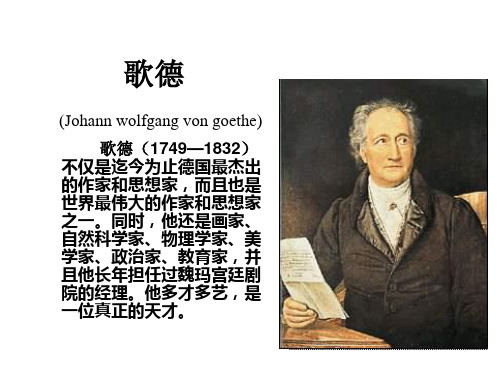
二、《浮士德》( Faust):哲学的心灵剧
歌德说过“德意志民 族的任务是在精神领 域里征服世界”,他 和康德、费希特、黑 格尔、马克思、恩格 斯、贝多芬等人实现 了这种征服。
《浮士德》的文化意义
“近代人失去希腊文化中人与宇宙的协和,又失 去了基督教对上帝虔诚的信仰,人类精神上获 得了解放,得到了自由,但也就同时失所依傍, 彷徨、摸索、苦闷、追求,欲在生活本身的努 力中寻得人生的意义与价值,歌德是这时代精 神的伟大的代表。……歌德与其替身浮士德一 生生活的内容,就是尽量体验近代人生特殊的 精神意义,了解其悲剧而努力,以求解决其问 题,指出解决之道。所以有人称他的《浮士德 》是近代人的圣经。”(宗白华)
英国戏剧家马洛写的《浮士德博士的悲剧历史 》
当他在斯特拉斯堡求学时就萌生了写作《浮士 德》的计划。①1773-1775年间,他写就了 《浮士德片断》。②1797年他开始重写《浮士 德》③1806年,完成了《浮士德》的第一部; ④而第二部则在1832年完成。
浮士德的形象
1、浮士德身上体现出了高度的历史概括性。歌 德通过浮士德一生的发展,概括了从宗教改 革或文艺复兴到19世纪初三百年来西欧资产 阶级上升时期进步人士不断追求知识、探索 真理的精神发展过程。因此,浮士德既是人 类积极精神的象征,也是当时欧洲先进知识 分子的艺术象征。
1. 爱情的烦恼
维特的烦恼: 2.事业的烦恼
3.社交的烦恼
《维特》“烦恼”的几种解读
作者自况说:认为维特是歌德本身的缩影, 歌德在自身经历的基础上创作了这个悲剧;
社会缩影说:认为维特的自杀跟当时的德 国的时代背景有着密切的关系;
作文素材:德国作家歌德的个人介绍-作文素材:德国作家歌德的个人介绍 作文素材-
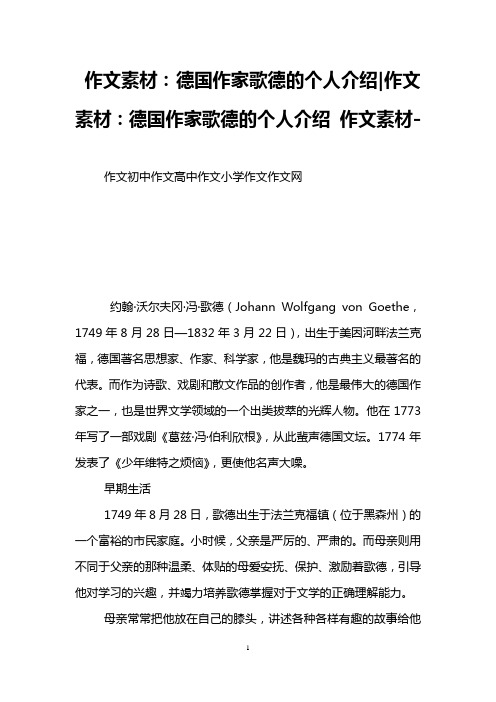
作文素材:德国作家歌德的个人介绍|作文素材:德国作家歌德的个人介绍作文素材-作文初中作文高中作文小学作文作文网约翰·沃尔夫冈·冯·歌德(Johann Wolfgang von Goethe,1749年8月28日—1832年3月22日),出生于美因河畔法兰克福,德国著名思想家、作家、科学家,他是魏玛的古典主义最著名的代表。
而作为诗歌、戏剧和散文作品的创作者,他是最伟大的德国作家之一,也是世界文学领域的一个出类拔萃的光辉人物。
他在1773年写了一部戏剧《葛兹·冯·伯利欣根》,从此蜚声德国文坛。
1774年发表了《少年维特之烦恼》,更使他名声大噪。
早期生活1749年8月28日,歌德出生于法兰克福镇(位于黑森州)的一个富裕的市民家庭。
小时候,父亲是严厉的、严肃的。
而母亲则用不同于父亲的那种温柔、体贴的母爱安抚、保护、激励着歌德,引导他对学习的兴趣,并竭力培养歌德掌握对于文学的正确理解能力。
母亲常常把他放在自己的膝头,讲述各种各样有趣的故事给他听。
母亲的语言表达能力很强,言辞新奇而丰富,歌德常常听得如醉如痴。
也许正是传承了母亲的这种才能,歌德成年以后母亲仍是跟他像朋友般共同探讨问题。
对于儿子的作品,母亲是凡有必读,并总能给予恰如其分的评论。
歌德悟性很高,妈妈一点就通,并能很快完善自己暴露出来的不足。
除了1750年12月7日出生的妹妹科尼丽亚·弗里德里柯·克里斯蒂娜之外,约翰·沃尔夫冈·冯·歌德的其他兄弟姐妹都很早夭折了。
1758年,歌德染上了天花。
歌德受到父亲和家庭教师的教育,也学习骑术和击剑。
歌德很早就已经对文学产生了兴趣。
在这方面他首先把注意力投向了克洛普斯托克和荷马。
14岁时,他就想参加一个田园诗协会。
同时,他也喜欢戏剧,因此在法国占领期间他频频造访法国剧院。
1763年他在一场音乐会上见到了当时年仅7岁的莫扎特。
Johann Wolfgang von Goethe
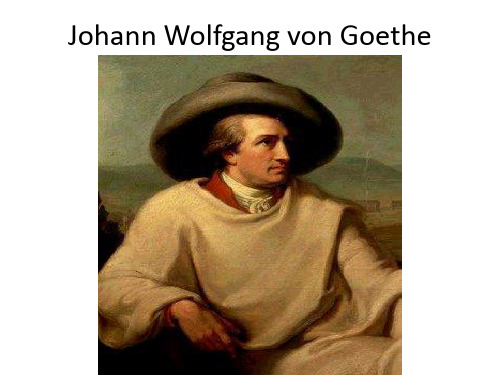
歌德评价
• 歌德是德国民族文学的最杰出代表,一个 伟大的诗人,思想家,小说家,戏剧家。 • 天性活跃,求知欲极强。他的智慧,他的 勤奋,他的执着,和他的长寿让他得以实 现自己的梦想。 • 缺少革命精神,太过于温雅。
• • • • • • • • • • • • • • • • • • • • • • • • • • • • •
大科夫塔》(喜剧),1792年 《平民将军》(喜剧),1793年 《列那狐》(动物叙事诗),1794年 《在所有美好的时刻》(共机会分会会歌),1775年 《德意志逃亡者讲述的故事集》(框形结构小说),1795年 《威廉·迈斯特的学习年代》,1795年/1796年原文 《克塞尼恩》(《赠辞》)(诗歌,和席勒合作完成),1796年 《浮士德 一部悲剧》(符合《浮士德》的第一部分),始于1797年,1808年第一次以此题目付印 《邦弗尼托·切利尼(Benvenuto Cellini)的人生》(文章),1797年 《中篇小说》,始于1797年 《赫尔曼与窦绿苔》(以六音部诗行写成的牧歌),1798年 《私生女》(悲剧),1804年 《威廉·迈斯特的漫游年代》(小说),始于1807年,1821年付印,增订版1829年原文 《潘多拉》(为节日创作的戏剧),作于1807年/1808年,1817年付印 《亲和力》,1809年原文 《论色彩学》(科学论文),1810年 《我的生平 诗与真》(自传作品,4卷本),1811年至1833年 《关于歌手人们有很多可说》(为感谢歌手而作的共济会的诗歌),1815年 《当回报最亲爱者的时候》 (为保守秘密而作的共济会的诗歌),1816年 《意大利游记》,1816年/1817年 《好女人》,1817年 《论艺术和古代》 (6卷本,和梅耶(Johann Heinrich Meyer)合作),1816年至1832年 《庄严的教团节日:“50年已经过去”》(对于授予他参加共济会50周年荣誉证书的诗歌形式的谢辞), 1820年 《西东诗集》(诗歌),1819年 《悼词起首》 对已故共济会里德尔(Ridel)分会长的悼词,1821年 《法国的政治运动》(报告),1822年 《讲话:对于维兰特(Wieland)兄弟般的纪念》 (共济会悼词), 1830年2月8日歌德致悼词 《浮士德 II》(《浮士德Ⅰ》的第二部分),1833年(遗作) 《箴言和沉思》,1833年(遗作)
介绍歌德的特点英语作文
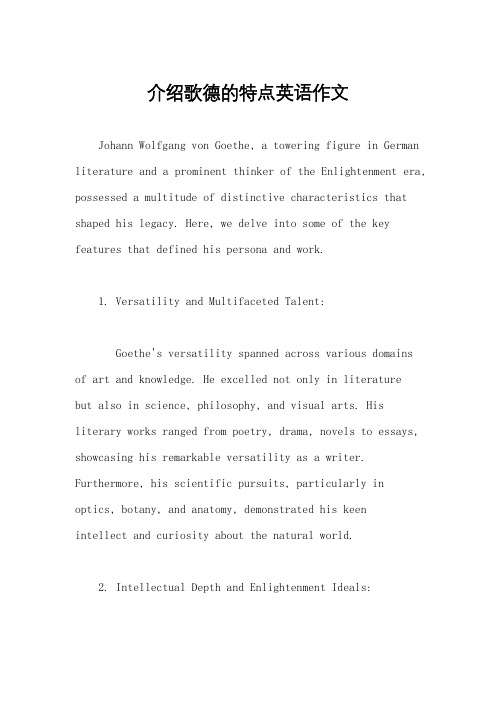
介绍歌德的特点英语作文Johann Wolfgang von Goethe, a towering figure in German literature and a prominent thinker of the Enlightenment era, possessed a multitude of distinctive characteristics that shaped his legacy. Here, we delve into some of the key features that defined his persona and work.1. Versatility and Multifaceted Talent:Goethe's versatility spanned across various domainsof art and knowledge. He excelled not only in literaturebut also in science, philosophy, and visual arts. Hisliterary works ranged from poetry, drama, novels to essays, showcasing his remarkable versatility as a writer. Furthermore, his scientific pursuits, particularly in optics, botany, and anatomy, demonstrated his keenintellect and curiosity about the natural world.2. Intellectual Depth and Enlightenment Ideals:Deeply influenced by Enlightenment ideals, Goethe's works often reflected his profound intellectual depth and commitment to rational inquiry. He was fascinated by the pursuit of knowledge and sought to explore complex philosophical and scientific concepts in his writings. Themes of reason, self-discovery, and the human condition permeate his oeuvre, reflecting his engagement with the philosophical currents of his time.3. Emotional Sensibility and Romanticism:Despite his rationalist leanings, Goethe was also deeply attuned to the realm of emotions and romantic sensibilities. His works, particularly his poetry and novels, often explored themes of love, longing, and existential angst with a depth of emotional insight. Through vivid imagery and lyrical language, he captured the nuances of human experience, resonating deeply with the Romantic movement that followed.4. Faustian Ambition and Striving for Excellence:Perhaps Goethe's most iconic work, "Faust," embodies his fascination with the human pursuit of knowledge and ambition. The character of Faust symbolizes the eternal quest for truth, wisdom, and fulfillment, even at the costof one's soul. This theme of relentless striving for excellence and the Faustian bargain has become synonymous with Goethe's ethos, reflecting his own insatiable thirstfor knowledge and experience.5. Cultural Legacy and Influence:Beyond his literary contributions, Goethe left an indelible mark on European culture and intellectual history. His works have been translated into numerous languages and continue to be studied and admired worldwide. Moreover, his role as a statesman and cultural figure in Weimar Germany solidified his legacy as a central figure of the German literary canon and a symbol of cultural excellence.In conclusion, Johann Wolfgang von Goethe's legacy is characterized by his unparalleled versatility, intellectual depth, emotional sensibility, Faustian ambition, andenduring cultural influence. His works continue to inspire and resonate with audiences, making him one of the most revered figures in the history of Western literature and thought.。
歌德的人物作文素材
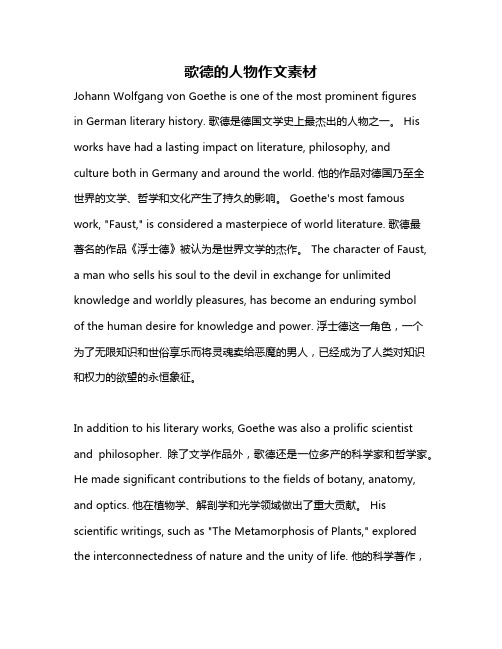
歌德的人物作文素材Johann Wolfgang von Goethe is one of the most prominent figuresin German literary history. 歌德是德国文学史上最杰出的人物之一。
His works have had a lasting impact on literature, philosophy, and culture both in Germany and around the world. 他的作品对德国乃至全世界的文学、哲学和文化产生了持久的影响。
Goethe's most famous work, "Faust," is considered a masterpiece of world literature. 歌德最著名的作品《浮士德》被认为是世界文学的杰作。
The character of Faust, a man who sells his soul to the devil in exchange for unlimited knowledge and worldly pleasures, has become an enduring symbolof the human desire for knowledge and power. 浮士德这一角色,一个为了无限知识和世俗享乐而将灵魂卖给恶魔的男人,已经成为了人类对知识和权力的欲望的永恒象征。
In addition to his literary works, Goethe was also a prolific scientist and philosopher. 除了文学作品外,歌德还是一位多产的科学家和哲学家。
He made significant contributions to the fields of botany, anatomy, and optics. 他在植物学、解剖学和光学领域做出了重大贡献。
歌德生平创造

艺术特点
在创作方法上,实现了现实主义和浪漫主 义巧妙结合。
在戏剧结构上,不受剧情的特殊要求和舞 台演出的局限,始终把表现人物作为结构 的中心。
在人物形象塑造上, 成功地运用了矛盾和 对比。
在艺术描写上,大量 运用象征手法。
典文学。 是指18世纪末席勒 与歌德在魏玛携手进行文学 创作,使德国文学达到了前 所未有的高峰。
诗剧《浮士德》第一部 (1808出版)
4、晚期创作(1805— 1832)
自传《诗与真》和《意大 和小 说《威廉·迈斯特的漫游时 代》
诗剧《浮士德》第二部 (1832)
美学思想
歌德的美学言论是创作实践和对各门艺术体会的 总结,散见于《诗与真》、《箴言与回忆》、《关于 艺术的格言和感想》、《歌德谈话录》。
1. 主张浪漫主义与古典主义结合。古典的和浪漫 的区分是现实与理想之分。
2. 重视形象思维,从具体形象中表现一般。 3. 艺术与自然的关系是主客观的辨证关系。 4. 提出建立民族文学,第一个提出在各民族文学 交流的基础上建立世界文学。
浮士德的典型意义:浮士德是资本主义上升时 期新兴资产阶级的巨人典型,他所体现的自强不息、 永远探索、永不满足的进取精神在今天仍是应该肯 定的。这是浮士德的需要结构给我们的启迪和人物 的典型意义之所在。
靡非斯特形象
魔鬼靡非斯特是浮士德的对立人物,又是独 特的社会势力的代表。
1. 靡非斯特的精神特征:否定精神。本质是 “作恶”,具有“造善”的作用。他从作恶的动 机出发,诱惑浮士德沉沦,实际上却推动浮士德 向上。因此,他是“作恶造善的力之一体”。
浮士德形象
浮士德是十八世纪末十九初的资产阶级人 道主义者,他具有崇高的理想和自强不息的进 取精神。浮士德对人生真谛和崇高理想的无限 追求是通过他的需要程度来表现的,反映了启 蒙时期资产阶级的探索精神。
歌德传记英语作文
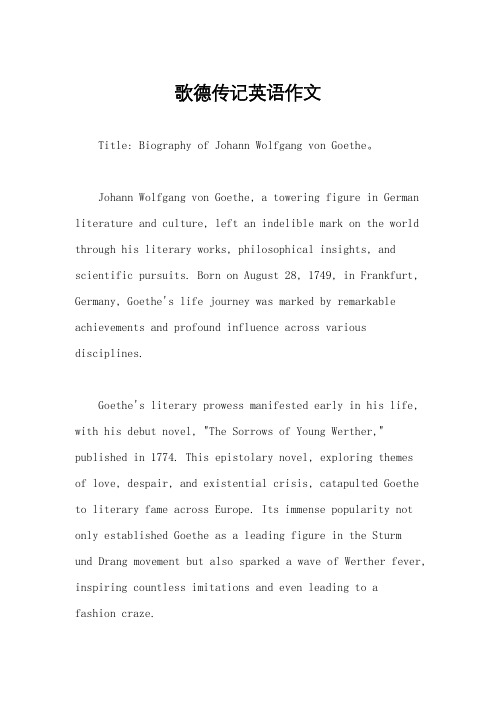
歌德传记英语作文Title: Biography of Johann Wolfgang von Goethe。
Johann Wolfgang von Goethe, a towering figure in German literature and culture, left an indelible mark on the world through his literary works, philosophical insights, and scientific pursuits. Born on August 28, 1749, in Frankfurt, Germany, Goethe's life journey was marked by remarkable achievements and profound influence across various disciplines.Goethe's literary prowess manifested early in his life, with his debut novel, "The Sorrows of Young Werther," published in 1774. This epistolary novel, exploring themesof love, despair, and existential crisis, catapulted Goethe to literary fame across Europe. Its immense popularity not only established Goethe as a leading figure in the Sturmund Drang movement but also sparked a wave of Werther fever, inspiring countless imitations and even leading to afashion craze.Following the success of "The Sorrows of Young Werther," Goethe embarked on a prolific literary career, producing a diverse array of works spanning poetry, drama, and prose. His masterpiece, "Faust," a tragic play exploring the eternal struggle between good and evil, remains one of the most celebrated works in world literature. Through the character of Faust, Goethe delved into profound philosophical inquiries, grappling with the complexities of human existence and the pursuit of knowledge.Beyond his contributions to literature, Goethe's intellectual curiosity extended to the realms of science and philosophy. His studies in anatomy, botany, and geology laid the groundwork for his seminal work, "Theory of Colors," wherein he explored the psychological and symbolic significance of color perception. Additionally, Goethe's scientific observations and theories on morphology and metamorphosis influenced generations of naturalists and scientists.As a statesman and cultural steward, Goethe played a pivotal role in shaping the cultural landscape of his time. Serving as an advisor to the Duke of Saxe-Weimar-Eisenach, Goethe contributed to various administrative and cultural reforms, promoting education, the arts, and scientific inquiry. His efforts to establish the Weimar Classicism movement, characterized by a synthesis of classical ideals and Romantic sensibilities, solidified his legacy as a central figure in German intellectual history.Throughout his life, Goethe remained deeply engaged with the philosophical currents of his era, engaging in correspondence with leading thinkers such as Friedrich Schiller and Johann Gottfried Herder. His philosophical reflections, articulated in works like "Wilhelm Meister's Apprenticeship" and "Maxims and Reflections," continue to resonate with readers seeking insights into the human condition and the nature of existence.In his later years, Goethe's creative energy continued unabated, as evidenced by his poetic cycle, "West-Eastern Divan," inspired by the poetry of the Persian mystic Hafez.This collection, infused with themes of love, longing, and cultural exchange, reflects Goethe's enduring fascination with the diversity of human experience and his belief in the universality of artistic expression.Johann Wolfgang von Goethe passed away on March 22, 1832, leaving behind a rich and multifaceted legacy that transcends national boundaries and temporal constraints. His literary, philosophical, and scientific contributions continue to inspire and enrich the lives of countless individuals around the world, reaffirming his status as one of the preeminent figures of Western civilization.In conclusion, Johann Wolfgang von Goethe's life and works embody the spirit of intellectual inquiry, artistic innovation, and cultural stewardship. His enduring legacy serves as a testament to the transformative power of literature, philosophy, and scientific inquiry in shaping our understanding of the world and ourselves.。
歌德
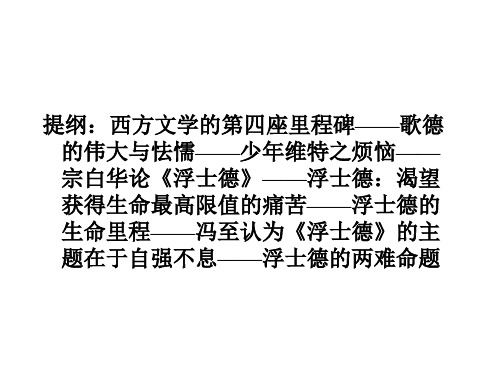
“浮士德难题”
“在我的心中啊, 盘踞着两种精神, 这一个想和那一个离分! 一个沉溺在强烈的爱欲当中, 以固执的官能紧贴凡尘; 一个则强要脱离尘世, 飞向崇高的先人的灵境。 哦,如果空中真有精灵, 上天入地纵横飞行, 就请从祥云瑞霭中降临, 引我向那新鲜而绚烂的生命!
“思想的线索而今业已寸断, 一切的学问久已使我恶心, 让我在这感官的世界的深处, 聊慰我这燃烧着的一片热情! 在那颠扑不破的魔术被覆之中, 我希望有奇妙的光景已经预订, 我要跳身进时代的奔波 我要跳身进事变的车轮, 苦痛、欢乐、失败、成功,我都不问, 男儿的事业原本要昼夜不停。
“你听呀! 快乐不是我所贪图。 我要献身于酩酊, 于最苦的欢情, 于失恋的憎恨, 于爽心的沉沦。 我的胸心, 已经解除了智的烦闷, 无论有怎样的苦痛它都欢迎。
调的美好日子,想到了后来的暗淡时日,想起了最 终的不快和失望,以及……我在房里来回急走。心 紧迫得几至于窒息。”
• 真情实感、强烈的时代精神、 高度的艺术性,三者和在一
起,赋予了《维特》以震撼 人心的巨大力量。
三、《浮士德》
《浮士德》是歌德以毕生心血完成的一部 杰作。它是歌德的代表作,也是当时欧洲 文学的最高成就。它与古希腊的“荷马史 诗”、但丁的《神曲》、莎士比亚的戏剧 齐名。是欧洲文学史上的第四座里程碑。 被文学史家认为是史诗性的巨著,在世界 文学史上享有崇高的声誉。
“我求求你……你听我说吧,我这个人完了,再也 忍受不住了!今天我坐在她房里……我坐着,她弹 着琴,弹了各式各样的曲子,可支支曲子全都触动 了我的心事!全都!全都!……你看怎么办?…… 她的小妹妹在我怀里打扮布娃娃。热泪涌进我的眼 眶。我低下头,目光落在她的结婚戒指上……我的 泪水滚落下来……这当儿,她突然弹起那支熟悉而 美妙的曲调,我的灵魂顿时感到极大的安慰,往事 立刻一件件浮上心头,我回忆起了初次听见这支曲
歌德英文简介
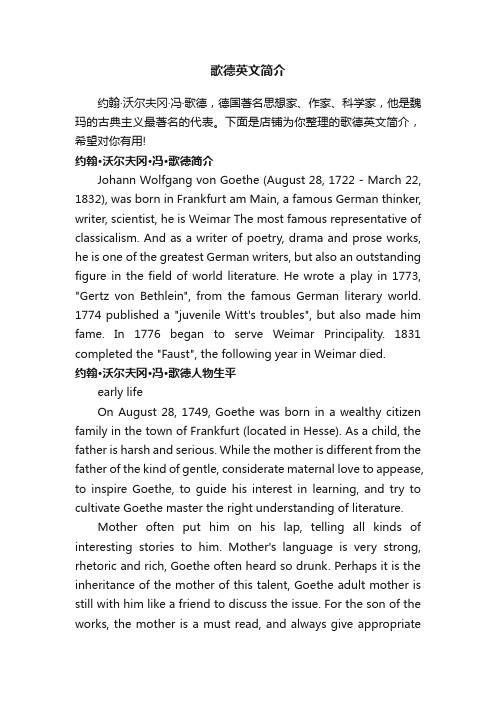
歌德英文简介约翰·沃尔夫冈·冯·歌德,德国著名思想家、作家、科学家,他是魏玛的古典主义最著名的代表。
下面是店铺为你整理的歌德英文简介,希望对你有用!约翰·沃尔夫冈·冯·歌德简介Johann Wolfgang von Goethe (August 28, 1722 - March 22, 1832), was born in Frankfurt am Main, a famous German thinker, writer, scientist, he is Weimar The most famous representative of classicalism. And as a writer of poetry, drama and prose works, he is one of the greatest German writers, but also an outstanding figure in the field of world literature. He wrote a play in 1773, "Gertz von Bethlein", from the famous German literary world. 1774 published a "juvenile Witt's troubles", but also made him fame. In 1776 began to serve Weimar Principality. 1831 completed the "Faust", the following year in Weimar died.约翰·沃尔夫冈·冯·歌德人物生平early lifeOn August 28, 1749, Goethe was born in a wealthy citizen family in the town of Frankfurt (located in Hesse). As a child, the father is harsh and serious. While the mother is different from the father of the kind of gentle, considerate maternal love to appease, to inspire Goethe, to guide his interest in learning, and try to cultivate Goethe master the right understanding of literature.Mother often put him on his lap, telling all kinds of interesting stories to him. Mother's language is very strong, rhetoric and rich, Goethe often heard so drunk. Perhaps it is the inheritance of the mother of this talent, Goethe adult mother is still with him like a friend to discuss the issue. For the son of the works, the mother is a must read, and always give appropriatecomments. Goethe perception is high, my mother on the pass, and can quickly improve their exposure to the lack of.In addition to the sister born on December 7, 1750, Cornelia Friedrich Cristina, John Wolfgang von Goethe's other brothers and sisters died prematurely. In 1758, Goethe infected with smallpox.Goethe was educated by father and tutor, and also studied riding and fencing.Goethe had long been interested in literature. In this respect he first turned his attention to Kloppstock and Homer. At the age of 14, he wanted to attend an idyllic association. At the same time, he also likes drama, so during the French occupation he frequently visited the French theater. In 1763 he saw at a concert that was only seven years old Mozart.On September 30, 1765 he left Frankfurt and studied law in Leipzig.From 17 October to 1768, Goethe studied at Leipzig. He listened to the poetic lecture of Christian Fürchtegott Gellert and took part in his writing style. At the same time he also accepted the Leipzig Institute Dean's painting course. He fell in love with Kaumlthchen Schoumlnkopf, and in the joyful and lightly verses, the book was praised in the Rococo style tradition. (The poem "Annette")Leipzig City's most famous and has a second long history hotel: Ouerbach Keller Hotel and the story of Faust here left him a deep impression that Ouerbach Keller became The only real place he was involved in the first part of the play "Faust". A massive hemoptysis allowed Goethe to interrupt his studies and returned to Frankfurt on August 28, 1768.Glorious periodIn 1776, Goethe began to serve as the Principality of Saxony-Weimar-Eisenach (Weimar) as a counselor of the Privy Council and received more political missions. He lived in his garden house (Goethe House) for six years and designed and built the garden around the house in accordance with the park's specifications. He also played an important role in the design of the natural landscape park on the edge of the Diellm in Thüringen. He wrote in his diary: "I want God to make me a gardener or an experimenter, so how happy should I be."He knew the aristocratic woman Charlotte von Stein. They have maintained a period of ten years of intimate relationship.In 1779 he was promoted to a pivotal adviser. He accepted the 8-year-old Grand Carmel Auguste, who made his appointment in the miniature country, Weimar, for political reform. In the parliament, Goethe's authority is growing. Politics - even after he ceases to be official - has always been his area of concern.This year he began to carry out in-depth natural science research.June 23, 1780, he became Weimar Masonic branch: Amalia (Amalia) branch of the students, June 23, 1781, Goethe became a full member, April 2, 1782 was promoted to president. A few weeks after his promotion, the Amalie branch had to stop working because the Masonic event was hostile.In 1782 the Grand Duke rented a house on the side of the Frauen plan to Goethe, and in 1792 it was eventually given to Goethe. Here Goethe has been living to death. Women's square side of the garden is also the poet's own construction. (In 1885, after the death of Goethe's last descendants and successors, the house of the woman's square was declared a national museum.After the Second World War, the house was severely damaged, so the gardener and writer Karl Fox Karl Foester came to Weimar and built the garden again.1777 Goethe made the first trip to the Harz Mountains. On December 10, he boarded the Brocken Hill (der Brocken), which was considered the first winter to climb the peak of the action. In 1783 he carried out a second trip to the Harz Mountains. Since then in 1784 he carried out the third and last trip to the Harz Mountains.As we all know, Goethe is a great poet, novelist, dramatist and eminent thinker. But few people know that he is a scientific researcher, and many disciplines studied: he engaged in the study of animal and plant morphology, anatomy, colorology, optics, mineralogy, geology, etc., and in individual areas Made a commendable achievement.In 1784 Goethe found the jaw bone in the human skull. Although the French scientist Weik Dasso had discovered it four years before, but Goethe was done independently without his knowledge.However, few people know that Goethe is a painter, more accurately, is a very accomplished painter. Goethe's nature is extremely active, his curiosity is very strong. He stretched out his spiritual reach into all areas of human knowledge and knew all the means of the outside world. His wisdom, his diligence, his deep eyes, his keen senses, and his long life of 82 spring and autumn, so that he in different areas - mainly in literary creation - have made Great contribution. In the art of painting, and almost always enthusiastic practice, painted as many as 2700, which is the vast majority of the landscape, including his scientific research drawn when the drawing and his copy of the humanbody and so on.In June 1768 Goethe went to Italy to concentrate on the study of the natural sciences. Engaged in painting and literary creation, successively completed the "in the Tory of Igorgainia" and "Lament" and other works, also wrote "Tasso" and "Faust" part of the chapter. At Weimar, only his close attendant and secretary, Philippe Se, knew the destination of his trip. In Italy, Goethe called "Filippo Miller" (Filippo Miller). The first letter he wrote to his family was not dated. T o Rome, Goethe only to his friends and relatives to report their own real decisions and plans: he would stay in Italy for a long time.Goethe described his Italian tour in The Travels of Italy. In 1786 he met the painter in Rome, and in 1787 he traveled with Tianshi and others to Naples. In the same year, the famous oil painting "Goethe in Italy" was born and painted in the paintings of the hills of Rome. Goethe also met Anglie Kaukman.Old age1788 back to Weimar only after the theater supervision, politically conservative, artistic pursuit of harmony, quiet classical beauty. After the interaction with Schiller in 1794, with the spread of democracy in Europe, the rise of national movement and the spread of utopian socialism, his thoughts and works also appeared a new leap, completed the "Faust" and other masterpieces.Goethe's old age, Europe has undergone a series of major historical events: the revolution has set off the climax of the whole European revolution, the advanced country's industrial revolution by leaps and bounds, the workers movement has been the rise of utopian socialism is widely circulated, romantic literature movement throughout All Europe. These circumstancesprompted Goethe's eyes to break through the narrow world of Germany, pay more attention to the whole of Europe, and even the world changes, more to accept the new social trends. Which will help him overcome the previous period of ideological narrowness. About 40 years old, Goethe's body becomes stiff and difficult to act. He suffered from severe disc injury and multiple thoracic deformations.In 1795 he began his friendship with Schiller. Schiller first came to Jena as a professor of history. Their friendship continued until 1805, when Schiller died.In 1798 Goethe wrote the mourning "plant deformation".Schiller died a year after Goethe and Christina Faulpius were married. Goethe lived with her from 1789 and had two sons: Auguste.At the occasion of the princes' congress in Erfurt, Napoleon I met Goethe and awarded him the honorary regiment.From the beginning of October 1813, Goethe focused on the distant China. He has borrowed more than 10 books on China in the library. Including Chinese travel and Chinese philosophy. He read some Chinese novels and poems through the translation of English and French, such as "good", "jade pear", "flower mind", "ancient wonders" and so on. He - wanted to "good", written as a long poem; read "Zhao orphans" after being inspired, he plans to write a drama. Between 1827 and 1829, he wrote 14 novels titled "The Four Seasons and Twilight", expressing his vision of the ancient kingdom of the East. By touching Chinese literary works, Goethe sees the common things of mankind. In his conversation with assistant Ackerman, he explained his understanding of China: "The Chinese are almost like us in terms of thought, behavior and emotion; they are all more clear andpure than they are here , More moral ... ... "He talked about Chinese literature from German literature and French literature, and then put forward the" world literature ", this new concept. He said: "I am more and more convinced that poetry is the common property of mankind.With the era of world literature has come now, everyone should contribute to it as soon as possible." It is worth mentioning that 20 years later, Marx And Engels in the "Communist Manifesto", another idea also put forward the "world literature" this concept.In 1814 Goethe traveled to the Rhine and Main areas. In 1817 he began writing "the history of my botanical research", founded the "talk on natural science, especially morphology" magazine (until 1824). Form a friendship with mineralogist, botanist Steinberg and musician.March 22, 1832 11:30, Thursday, Goethe died. His last words are: "Give me more lights!" This reflects his optimism as a great writer. March 26 buried in the princes cemetery.。
- 1、下载文档前请自行甄别文档内容的完整性,平台不提供额外的编辑、内容补充、找答案等附加服务。
- 2、"仅部分预览"的文档,不可在线预览部分如存在完整性等问题,可反馈申请退款(可完整预览的文档不适用该条件!)。
- 3、如文档侵犯您的权益,请联系客服反馈,我们会尽快为您处理(人工客服工作时间:9:00-18:30)。
歌德英语简介
Johann Wolfgang von Goethe (August 28, 1722 - March 22, 1832), was born in Frankfurt am Main, a famous German thinker, writer, scientist, he is Weimar The most famous representative of classicalism. And as a writer of poetry, drama and prose works, he is one
of the greatest German writers, but also an
outstanding figure in the field of world literature. He wrote a play in 1773, "Gertz von Bethlein", from
the famous German literary world. 1774 published a "juvenile Witt's troubles", but also made him fame. In 1776 began to serve Weimar Principality. 1831 completed the "Faust", the following year in Weimar died.
Goethe not only good painting, extensive
research on the natural sciences, its creation
includes lyrics, no rhyme free poetry, group poems, long narrative poems, herdsmen poems, historical poems, historical drama, tragedy, drama, novels, short stories, educational novels , Epistolary novels and autobiographical poetry, prose and other genres of literary works. The most famous is the epistolary
novel "Juvenile Witt's troubles" (1774), poetic philosophy tragedy "Faust" (1774 ~ 1831) and the novel
"William Masters" (1775 ~ 1828). "Youth to maintain the trouble" because of a generation of young anti-feudal voice, by the masses warm welcome, so that Goethe from the enjoyment of the world's voice. "Faust" based on the German 16th century on the legend of Dr. Faust, to the processing and transformation. Is the rise of the European bourgeoisie bourgeois advanced people continue to explore, the pursuit of
art summary. The tragedy is not only the structure of the magnificent, colorful, into the realism, romanticism and symbolism as a whole, and let the main characters Faust and the devil Felicity of the whole words and deeds are formed good and evil, line and love, The dialectical development of relations.
The brilliant achievement of Goethe's life, especially the later creation, is inseparable from his adherence to this principle of realism. Goethe had led the frantic movement in his early years and preferred romanticism. But later realized that the romantic "morbid", turned to classicalism. Goethe advocated by classicalism, in essence, is realism. Realism is a focus of Goethe's later theoretical thinking. In the historical process of the development of Western realism theory, Goethe's realist literary thought is regarded as a milestone, which has given the development of European realist literature directly。
